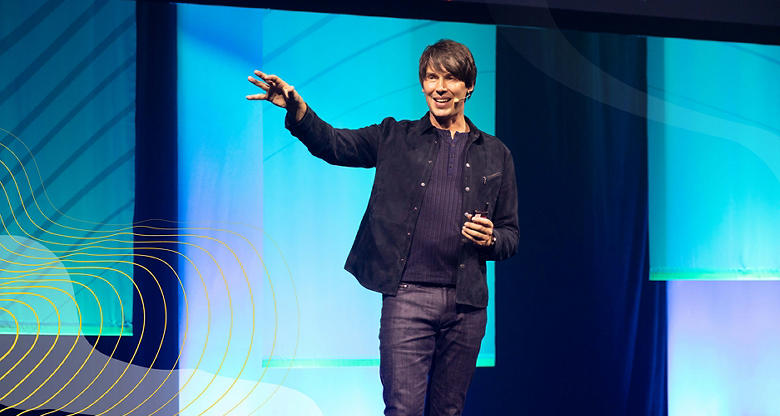Key points
- The universe is “dauntingly big” – the challenge is to decide what it means.
- Discoveries about black holes are helping to develop quantum computers.
- We may be alone, but that makes preserving life on Earth even more important.
Brian Cox is known as a ‘rock star physicist’ for a good reason. He was a member of not one, but two successful bands before he attained his PhD in high-energy particle physics. These days, he is best known for his engaging documentaries about the universe.
Our place in the universe
Cox spoke at Commonwealth Bank’s recent Momentum conference on sustainability and opened his presentation by conveying the scale and size of the universe. Our galaxy, the Milky Way, has about 400 billion stars in it. To date, we have detected well over 5,000 planets orbiting those stars, he said. And that means we can estimate the number of Earth-like planets in our galaxy.
“We think that number is something like 20 billion. That means 20 billion rocky planets the right distance from their star to potentially support liquid water on the surface and, therefore, life,” said Cox.
Zooming out to the next level, Cox showed the audience a visualisation of the observable universe. He described the image as “dauntingly big”, with each point of light representing a galaxy with between 400 billion to a trillion stars. But most mind-blowing of all is the sheer number of galaxies in the known universe: two trillion.
“The challenge of cosmology, of astronomy, and I suppose the intellectual challenge for all of us, is to decide what that means,” he said.
Next, Cox took the audience on a fly-by of a black hole – a place where time ends. Black holes were predicted more than 100 years ago by Einstein’s general theory of relativity, which describes the interwoven nature of space and time. In recent years astronomers have managed to photograph black holes, and they resemble the same ‘doughnut’ shape that we’d expect from Einstein’s theory, Cox said.
Quantum computers and science funding
But what relevance do black holes have for us back on Earth? Quite a lot, it turns out. According to Cox, the theory underpinning black holes has an important application in the development of quantum computers, an area of interest for CommBank.
Yet no-one could have predicted that studying black holes would lead to the development of quantum computers. And that has ramifications for the funding of science research generally, Cox said.
“It’s very hard to understand where the knowledge that we are going to find useful – or even, perhaps, need desperately – in the next decades or centuries will come from.”
As economic times get harder, the worry for Cox is that research which doesn’t seem to deliver an immediate return will be lost. By jettisoning those areas of science, governments around the world risk losing the ‘conveyor belt’ of new and important discoveries, he explained.
“The collaboration between theoretical physicists working on the black hole information paradox and computer scientists is getting more and more intimate all the time,” he said.
Putting a price on civilisation
Given the staggering scale of the universe, it was surprising to hear Cox downplay the likelihood of life beyond our planet – at least in our galaxy. He pointed to the SETI project, which has been listening for a signal from other civilisations for more than 50 years.
“Astronomers call it the great silence. And the reason perhaps is that there is nobody else out there because it’s just too difficult [for complex life to form]. There might be microbes all over the place, but civilisations on average are maybe one per galaxy,” he said.
It might sound depressing, but for Cox it provides great perspective and connects astronomy with Earthly concerns about the environment.
“Just imagine that this is the only place in this galaxy of 400 billion suns where there are collections of atoms like us that can think and feel.
“It means that if we eliminate ourselves through deliberate action or maybe inaction, then we run the risk, and I would argue this is a real risk, of eliminating meaning perhaps forever in this galaxy.
“And I think that context is worth considering because it tells us that – perhaps paradoxically –the science that tells us we were physically insignificant has also possibly told us that we are indescribably valuable,” he said.
It was a fitting conclusion to the Momentum conference, which was about accelerating Australia’s – and, by extension, the world’s – transition to a more sustainable and biodiverse planet.
Our expert on the universe
Professor Brian Cox is Professor of Particle Physics at the University of Manchester. Arguably the UK's best-known experimental physicist, Brian Cox’s books and TV programs have been read and watched around the world and credited with making science engaging and accessible to millions. With his down-to-earth, likeable enthusiasm, he is frequently labelled a ‘rock star scientist’, in part due to his time as a professional musician. He is now the Professor of Particle Physics at the University of Manchester and a key part of the ATLAS experiment at the CERN Large Hadron Collider. An International Fellow of the Explorers Club, he was awarded the prestigious Lord Kelvin Award for his work in promoting science to all. When not filming around the world, Cox writes for a range of newspapers and journals. He also serves as the British Royal Society’s Professor for Public Engagement in Science.
To watch this session on-demand or explore other content from CommBank Momentum 2022, visit Momentum.
To learn more from leading industry experts about the move to a net-zero economy, head to CommBank Foresight™ – insights for future-facing businesses.

